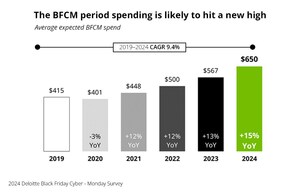WASHINGTON, Feb. 19, 2013 /PRNewswire/ -- New Deloitte research shows that mobile technology could help close the widening productivity gap between the private and public sectors. The research report, "Gov. on the Go: Boosting Public-Sector Productivity by Going Mobile" argues that mobility presents the government with an opportunity to hit the reset button and drive efficiency and productivity from technology.
(Logo: http://photos.prnewswire.com/prnh/20120803/MM52028LOGO-a )
(Logo: http://photos.prnewswire.com/prnh/20120803/MM52028LOGO-b )
The report shows that the public sector lags in its ability to dynamically absorb new technologies and use them to their full advantage. Stronger mobile utilization offers the public sector an opportunity to make considerable strides at a modest cost, which can result in the type of efficiency gains already prevalent in the private sector.
"The private sector's enthusiastic adoption of mobile technology has led to great gains in efficiency and productivity," said Jessica Blume, vice chairman, Deloitte LLP and U.S. public sector leader. "With these experiences as a guide, mobile advancement within the public sector can do the same. Taking it a step further, government agencies can redesign their business models by engaging individual citizens as co-creators who contribute information and services with their government, rather than simply receiving it from them."
Although the public sector is often a late adopter of new technologies, government's entry into the mobile world is picking up speed. The mobile revolution is already transforming national defense policy with the introduction of iPads into the flight bags of U.S. Air Force pilots. According to the U.S. Air Force Electronic Flight Bag team, shifting away from paper maps, manuals and charts to an electronic flight kit led to a 90 percent reduction in staff hours required to build and maintain paper-based materials, saving 22,000 staff hours per year. Transporting less paper also means lighter planes, to the tune of the Air Force spending $770,000 less on fuel annually.
According to the report, aggressive mobile technology deployment to transform service delivery could result in significant benefits for both taxpayers and government workers:
- If mobile-generated productivity reduced new U.S. federal government hires by even 10,000 over a decade, the corresponding lifetime salary and pension savings could exceed $25 billion.
- Mobile data access can help police officers save 30 minutes every day. Assuming that half of the 636,410 officers in the U.S. lack access to this technology, adopting it could save them more than 50 million hours or $1.3 billion in monetary terms.
- Greater mobile adoption by caseworkers could result in 57 million additional hours of services to the community annually.
"If government agencies look at business processes from a user point of view and couples that with mobile technology, they can begin to solve problems and interact in a way they never thought possible," said Rob Frazzini, principal, Deloitte Consulting LLP and leader of the federal digital practice. "Mobile tech has the potential to reduce costs, increase work output and help the government to overcome limitations of time, space and location."
U.S. federal agencies too are becoming more aware of the benefits associated with mobile-enhanced telework. The 2012 Federal Telework report shows that 32 percent of the federal workforce is eligible to telework, yet only 7 percent actually do. By increasing the number of teleworked hours to half the work-week for eligible employees, estimates in the report show that $5.4 billion could be saved through reduced turnover and absenteeism, increased productivity gains and downsized office space.
Beyond increasing productivity, mobile can revolutionize how governments interact with citizens. Mobile platforms offer a new way to provide much-needed services 24 hours a day, 7 days a week in a radically efficient way, even engaging citizens themselves in the delivery of services. Viewed this way, mobile offers a path to a more participatory, proactive public sector capable of much greater efficiency than today's productivity rates suggest.
For the complete research report, please find it here.
About Deloitte's Federal Government practice
Deloitte provides consulting, financial advisory, risk management, audit, and tax services to selected clients. More than 6,600 professionals are dedicated to serving U.S. federal clients with wide-ranging missions. Deloitte is helping federal organizations explore how to be more efficient or seize the opportunity to do things differently, with a deep understanding of the government's requirements, processes and systems along with insights into workforce and technology issues. Deloitte applies a mix of private-sector insights and public-sector experience to help federal agencies rethink, reduce, and restructure—from day-to-day operations and large-scale transformations. To learn more, visit www.deloitte.com/federal.
About Deloitte's State Government practice
Deloitte has served state governments for more than 45 years, including 45 of the 50 U.S. states, as well as the District of Columbia, Guam and Puerto Rico. Deloitte focuses on five areas crucial to state governments: health and human services, finance and administration, transportation, education, and labor and industry. Learn more about Deloitte's U.S. State Government practice at http://www.deloitte.com/us/stategovernment.
As used in this document, "Deloitte" means Deloitte LLP and its subsidiaries. Please see www.deloitte.com/us/about for a detailed description of the legal structure of Deloitte LLP and its subsidiaries. Certain services may not be available to attest clients under the rules and regulations of public accounting.
SOURCE Deloitte
WANT YOUR COMPANY'S NEWS FEATURED ON PRNEWSWIRE.COM?
Newsrooms &
Influencers
Digital Media
Outlets
Journalists
Opted In






Share this article